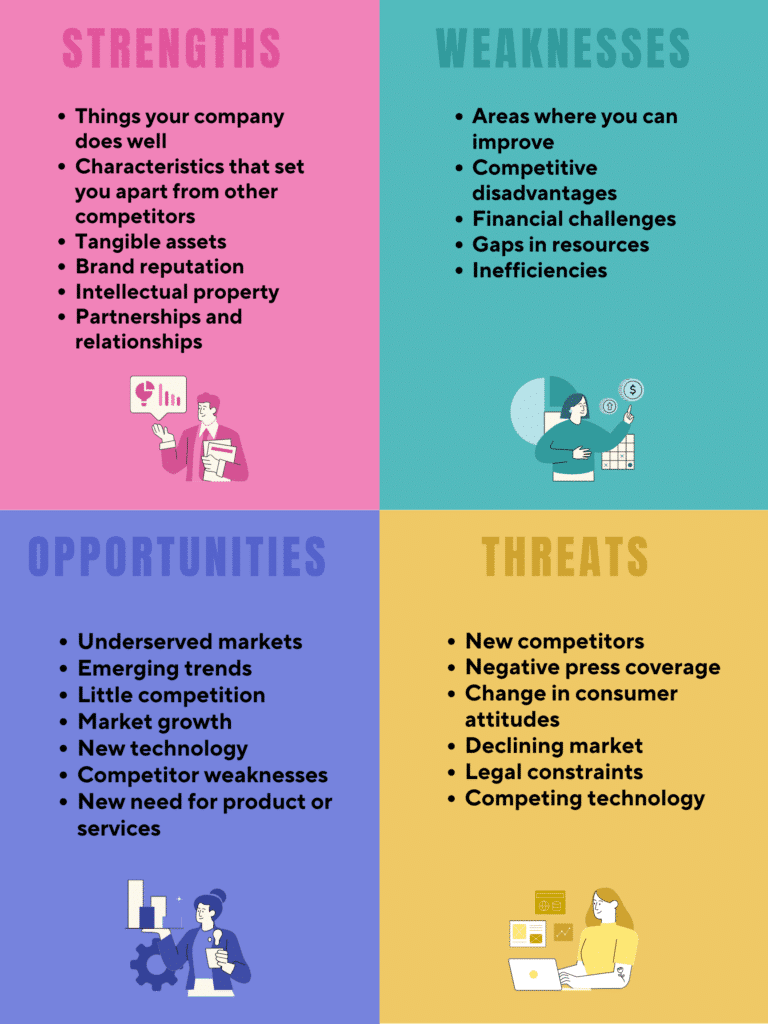In today’s dynamic business landscape, a well-crafted marketing plan is crucial for any company aiming to thrive and grow. Whether you’re a startup or an established enterprise, a strategic marketing plan serves as your roadmap to effectively reach and engage your target audience. Here, Searched Marketing helps outline six essential steps to help you develop an outstanding marketing plan that drives results.
Six-Step Marketing Plan
1. Do Your Research
Before diving into any marketing initiatives, it’s important to conduct a thorough market analysis, including a SWOT (Strengths, Weaknesses, Opportunities, Threats) analysis. This step provides a clear understanding of your business’s current position in the market and the external factors that could impact your strategy.
- Market Analysis: Start by assessing the overall market landscape, including industry trends, customer preferences, and competitor activities. Identify emerging opportunities and potential threats that could influence your business’s growth.
- SWOT Analysis: Evaluate your business’s internal strengths and weaknesses, such as unique offerings, resources, and operational capabilities. Additionally, analyze external opportunities and threats that could affect your market positioning and competitive advantage.

By conducting a comprehensive market and SWOT analysis, you’ll gain valuable insights that will inform the rest of your marketing plan and help you capitalize on opportunities while mitigating potential risks.
2. Find Your Target Audience
Understanding your target audience is crucial for developing targeted marketing strategies that resonate with potential customers. Define your target audience based on demographic factors (age, gender, income), psychographics (values, interests, lifestyle), and behavioral patterns (purchase habits, brand preferences).
- Buyer Personas: Create detailed buyer personas that represent your ideal customers. These personas should include information about their goals, pain points, buying behavior, and where they typically consume information.
- Segmentation: Segment your audience based on common characteristics to tailor your marketing messages and strategies more effectively. This segmentation allows you to personalize your approach and deliver relevant content that addresses the specific needs and interests of each segment.
3. Create Attainable Goals
Setting clear and measurable goals is essential for tracking progress and evaluating the success of your marketing efforts. Your goals should align with your overall business objectives and be specific, measurable, achievable, relevant, and time-bound (SMART).
Examples of Marketing Goals:
- Increase brand awareness by 20% within the next six months.
- Generate 500 new leads per month through digital marketing campaigns.
- Achieve a 15% increase in online sales by the end of the year.
Establishing concrete goals provides direction for your marketing activities and helps prioritize initiatives that contribute to business growth.
4. Develop A Strategy
Based on your market analysis, target audience insights, and defined goals, develop a comprehensive marketing strategy that outlines how you will achieve your objectives.
Key Components of Your Marketing Strategy:
- Positioning and Messaging: Clearly articulate your unique value proposition (UVP) and develop compelling messaging that resonates with your target audience.
- Marketing Channels: Identify the most effective channels to reach your audience, such as digital marketing (SEO, PPC, social media), traditional advertising, content marketing, email marketing, and more.
- Campaign Planning: Plan integrated marketing campaigns that align with your objectives and leverage multiple touchpoints to maximize reach and engagement.
Your strategy should be flexible enough to adapt to changes in the market and consumer behavior while remaining focused on achieving your defined goals.
5. Create and Implement a Budget
Allocate a realistic budget that aligns with your marketing goals and strategy. Consider expenses such as advertising costs, management costs, marketing software/tools, content creation, and campaign management.
- Budget Allocation: Prioritize investments based on the expected return on investment (ROI) for each marketing initiative. Allocate resources effectively to maximize the impact of your campaigns within budget constraints.
- Implementation: Execute your marketing plan according to the defined timeline and monitor the performance of each campaign closely. Use analytics and key performance indicators (KPIs) to measure progress and adjust strategies as needed to optimize results.
- Employee Resource Cost: Sometimes you may have an employee assigned to ongoing task or working with your marketing agency. Its important to identify how many hours that employee needs each month so the company can allocate that time and also build this into the marketing budget.
- Marketing Agency Cost: Cost for this can vary but can be less than a full time employee to have multiple Subject Matter Experts (SME’s) propel your campaign results.
By creating a detailed budget and implementing your marketing plan systematically, you can effectively manage resources and achieve your business objectives while maximizing ROI.
At Searched Marketing we have full time marketing strategists, copywriters, video and photographers, visual designers and developers. These resources act as an extension of your company to help you with your visibility, lead generation and eCommerce sales. Taking the guesswork out of your marketing campaign with tried and proven methods to optimize your budget for each channel.
Step 6: Analyze Often
On a weekly and monthly basis your marketing team should review the website’s visibility and analytics. You will also want to measure your Cost Per Conversion and/or Cost Per Lead for each channel: Ads, Google Business, Organic, Social and Email.

Ready to Build A Successful Marketing Plan?
Searched Marketing is fully staffed to help you build a marketing plan for your business and present real results. Our marketing services are tailored for small to large corporations, medical companies, e-commerce stores, local businesses, and publicly traded companies.
We build solid foundations that generate new leads and grow real results. As a business owner, it can be enticing to use your own employees to save on cost. However, you will often get results faster and at a lower ROI from a marketing agency like Searched Marketing. We have a full staff that specialize in marketing strategy, Google Business optimization, Google Ads Management, SEO and Social Media. Our in-house resources take the guesswork out of your marketing campaign and can deliver results based on what we have learned over the years. Experience our marketing process and contact us today to get started!